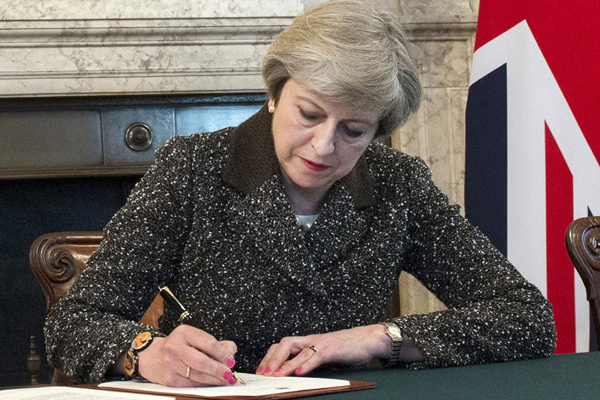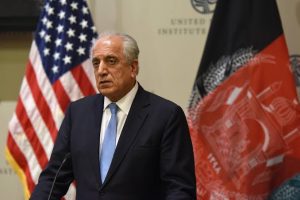UK PM May Triggers Brexit Article 50

MEP: UK Prime Minister Theresa May has triggered the formal two-year process of negotiations that will lead to Britain leaving the European Union (EU), the most complex debates London has held since World War Two.
She has warned European leaders that failure to reach a comprehensive Brexit agreement will result in a weakening of cooperation on crime and security, triggering accusations that her remarks amounted to blackmail.
As Theresa May on Wednesday officially initiated Britain’s exit from Europe — Brexit, in everyday talk — the lack of disaster was touted by those steering the departure as a sign of little trouble ahead.
“There were predictions about what would happen to the economy if the United Kingdom voted to leave,” Ms. May told Parliament on Wednesday. “Those predictions have not proved to be correct. We see a strong economy.”
On behalf of May, British Ambassador to the EU Tim Barrow hand-delivered a letter to European Council President Donald Tusk in Brussels to officially notify the EU of Britain’s decision to withdraw from the bloc.
The six page letter invoked Article 50 of the EU Treaty, the mechanism for starting Britain’s divorce process.
In her speech to Parliament, which was planned to coincide with the letter’s delivery, May urged the country to come together as it embarks on a “momentous journey.”
Some Brexit supporters have leapt on the implied threat, with the Sun front page on Wednesday trumpeting: “Your money or your lives: trade with us and we’ll help fight terror.” The Daily Mail accused the EU of “wailing about PM’s ‘blackmail’”.
But work and pensions secretary Damian Green called the row a “misunderstanding”, saying the two issues had been grouped together in the letter because they were “all bound up in our membership of the European Union”.
Green told BBC2’s Newsnight: “It’s not a threat, I think that’s the misunderstanding. It’s absolutely not a threat.”
David Cameron, former UK Prime Minister has defended his decision to call the referendum that ended in the vote to leave.
“I thought it right to hold the referendum because this issue had been poisoning British politics for years. The referendum had been promised and not held,” the former British prime minister said during a visit to Ukraine on Wednesday, in quotes reported by Agence France-Presse.
Having enshrined the commitment to hold a referendum in the Conservative manifesto for the 2015 general election, Cameron said he had to fulfil the pledge – despite campaigning himself for the UK to vote remain: “I made a promise to hold a referendum. I think it was the right thing to do.”
Within hours of the result – in which 17.4 million people voted to leave the EU, a 52%-48% victory for Brexit campaigners – Cameron announced his resignation.
Speaking on Wednesday, he conceded that things had not gone to plan: “We held the referendum and, of course, the result is not the result that I sought.
“But it was a decisive result and that’s why today Theresa May quite rightly is taking the next step to ensuring the people’s will is followed through.”
The immediate impact of Mrs. May’s action was to start negotiations on future dealings across the English Channel. Those talks have a two-year deadline. If no deal is struck before then, Britain and Europe would plunge into a state of chaotic uncertainty.
Trade would revert to the rules of the World Trade Organization, making Britain’s exports to Europe vulnerable to tariffs and other barriers to commerce, including health and safety rules.
London’s bankers would be effectively severed from Europe, with many transactions for clients based on the Continent rendered illegal.
Britain voted to leave the EU last June, after a campaign that divided the country. In a close result, 52 percent voted for Brexit, while 48 percent wanted to stay in the EU.
Scotland and Northern Ireland voted overwhelmingly to remain in the EU, while England and Wales, with a much larger combined population, voted to leave.





